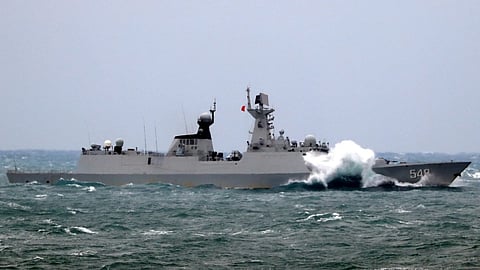

China will attempt to further boost its recent strategic diplomacy and power projection efforts as it hosts its annual security forum this week amid roiling regional tensions.
Foreign diplomats and security analysts say they expect Chinese officials will use the Beijing Xiangshan Forum to push President Xi Jinping's vision of the international order he outlined earlier this month, calling for unity against "hegemonism and power politics," a swipe at the United States.
Some 1,800 representatives from 100 countries, including officials, military personnel and scholars, will attend the three-day event which opens on Wednesday, China's official Xinhua news agency reported.
For some foreign representatives, particularly from Western and neighbouring countries, the seminars and networking are a chance to glean more details on China's evolving military modernisation, as well as the opaque leadership of the People's Liberation Army, the world's largest armed force.
"We can be sure foreign participants at this year's Xiangshan will try to extract more technical information about some of the weapon systems from their counterparts in the PLA," said James Char, a China security scholar at Singapore's S. Rajaratnam School of International Studies.
While China displayed for the first time a host of new arms at its September 3 military parade, including hypersonic weapons, large submersible drones and a re-tooled long-range nuclear missile, analysts say question marks remain about whether they are operational and how effective they would be in a conflict.
More than a dozen generals - many formerly close to Xi - have been purged from the PLA over the past two years and diplomats say the event is also a chance to get a better idea of the precise command structure, particularly inside the commanding Central Military Commission.
They say that is particularly important amid simmering tensions and disputes across East Asia, marked this week by the PLA navy trials of its third and most advanced aircraft carrier in the disputed South China Sea, and Japanese and US exercises in Okinawa with the Typhon missile system, a high-powered anti-ship weapon.
Most Western and allied militaries will be sending relatively low-level delegations, preferring to keep the annual Shangri-La Dialogue in Singapore as the region's key informal security conference, diplomats said.
The US will be sending the defence attache from its embassy in Beijing, a Pentagon spokesperson said. Washington sent a deputy assistant secretary of defence last year but Pentagon leadership had determined that the attache, "was the appropriate level of representation," the spokesperson said.
Singapore Defence Minister Chan Chun Sing and his Malaysia counterpart, Mohamed Khaled Nordin, will both be attending, officials in both countries confirmed, while a South Korean defence ministry spokesperson said an official from the state-run Korea National Defence University is going.
The Chinese Defence Ministry has confirmed delegations from Russia, France, Brazil, Nigeria, Singapore and Vietnam, according to state media reports.
(Reporting by Greg Torode in Hong Kong and the Beijing newsroom; additional reporting by Phil Stewart and Idrees Ali in Washington, Rozanna Latiff in Kuala Lumpur, Xinghui Kok in Singapore, Daniel Leussink in Tokyo and Josh Smith in Seoul; Editing by Lincoln Feast.)
